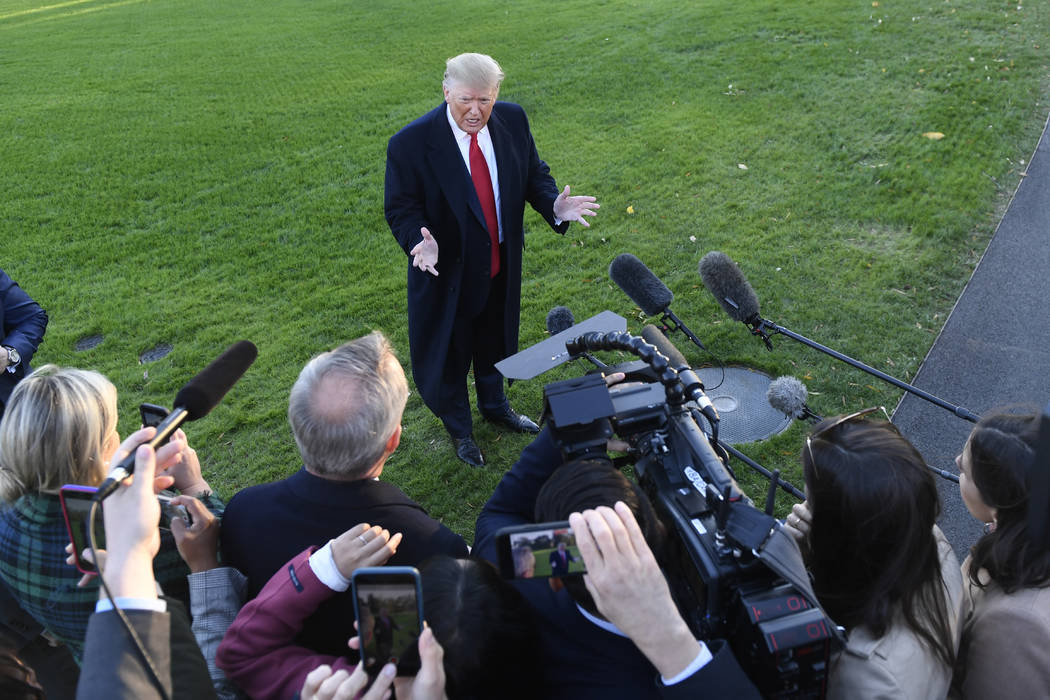DEBRA J. SAUNDERS: Count on big media to protect anti-Trump sources

WASHINGTON
It’s so precious watching big-name journalists speak of the sanctity of guarding the anonymity of the Ukrainian phone call whistleblower.
They say they are concerned that publishing the whistleblower’s name will discourage other whistleblowers from coming forward. Funny, they didn’t seem to care in 2010 when, thanks to WikiLeaks, diplomatic emails were splayed across front pages, and national security officials were complaining that the leaks hindered their work and spooked worthy allies.
If there is one group big media will support, it is anonymous sources who discredit President Donald Trump.
And notice how they want to protect a source’s privacy — until it becomes a disposable tool to a political end.
Like Anita Hill, Christine Blasey Ford was a reluctant witness against now-U.S. Supreme Court Justice Brett Kavanaugh. Her privacy was sacrosanct and her vulnerability unassailable — right up until the moment when her testimony was needed to destroy Kavanaugh’s reputation.
The whistleblower? If House Democrats had needed Whatshisname’s identity to bury Trump in the Ukraine affair, you know they’d have thrown his cloak under the bus in a heartbeat — “for the good of the country.”
But Trump made unmasking the whistleblower unnecessary when he released a rough transcript of a July 25 phone conversation during which the president suggested that Ukrainian President Volodymyr Zelenskiy dig up dirt on former Vice President Joe Biden, whose son Hunter was paid the princely sum of about $50,000 a month for his association with a Ukrainian energy concern.
And so big media keep running stories about the ethics of unmasking the whistleblower rather than unmasking the whistleblower. A profession that prides itself on delivering information to the public without fear or favor is sitting on its hands.
And they’re having these debates as Whatshisname’s name is all over social media.
A network or major newspaper with a national security team should have been able to get his name weeks ago. The New York Times was the first paper to report that the whistleblower was a CIA officer who had been detailed inside the White House, but the paper left out his name. It’s as if the Gray Lady didn’t want to know because it wasn’t fit to print.
It took RealClearInvestigations to provide a name and information about the mystery man’s political affiliation (Democrat) and career (he worked in the Obama administration).
Why am I not reporting it? Your humble correspondent lacks the national security sources to corroborate the rumors, and I cannot verify the name or information in the story.
Also, I would caution against jumping to conclusions because of Whatshisname’s party registration or work in a Democratic administration. That’s what happens when you vote and work in government.
But if this guy left the White House in mid-2017 because he was “accused of working against Trump and leaking against Trump,” as RealClearInvestigations’ Paul Sperry reported, then there’s a two-year gap between his service in the administration and the July 25 phone call in question.
I called a former intelligence official whom I respect to discuss the controversy over the whistleblower’s identity. He (yes he) said it doesn’t matter who the whistleblower is because the transcript corroborated the gist of the whistleblower’s complaint. That’s what matters to the official. And, by the way, he could have leaked this information to the press but instead rightly went through official channels.
What matters is that Trump tried to pressure the leader of a vulnerable ally to do his campaign’s opposition research, he said, and that should trouble everyone. It troubles me.
That’s the message we keep hearing from the intelligence community and impeachment enforcers: Don’t look at the investigators. There’s nothing to see here.
Personally, I’ve had enough of being told that it would be wrong to investigate the investigators, who were duty-bound to follow up on information linking the 2016 Trump campaign to the Kremlin.
Because I still don’t know why special counsel Robert Mueller’s probe didn’t end sooner when G-men should have figured out that there was no coordination between Moscow and Trump Tower. (Yes, there was one meeting in 2016, but no follow up.)
I want to know how many, if any, FBI and intelligence officials were aware of the origins of a so-called dossier written by a former British intelligence officer and funded by the Democratic National Committee and Hillary Clinton’s campaign. And I want to know if there was some sort of in-house cabal just waiting for Trump to screw up so they could toss him.
I don’t like Trump pushing another world leader to help his campaign one bit. But if there were a number of aides who were waiting for Trump to screw up, and it actually took more than two years to come up with a truly compromising story, I have to say I am pleasantly surprised.
And one other thing: If the whistleblower had ratted out President Barack Obama, who thinks big journalism would care about the whistleblower’s privacy?
Contact Debra J. Saunders at dsaunders@reviewjournal.com or 202-662-73891. Follow @DebraJSaunders on Twitter.